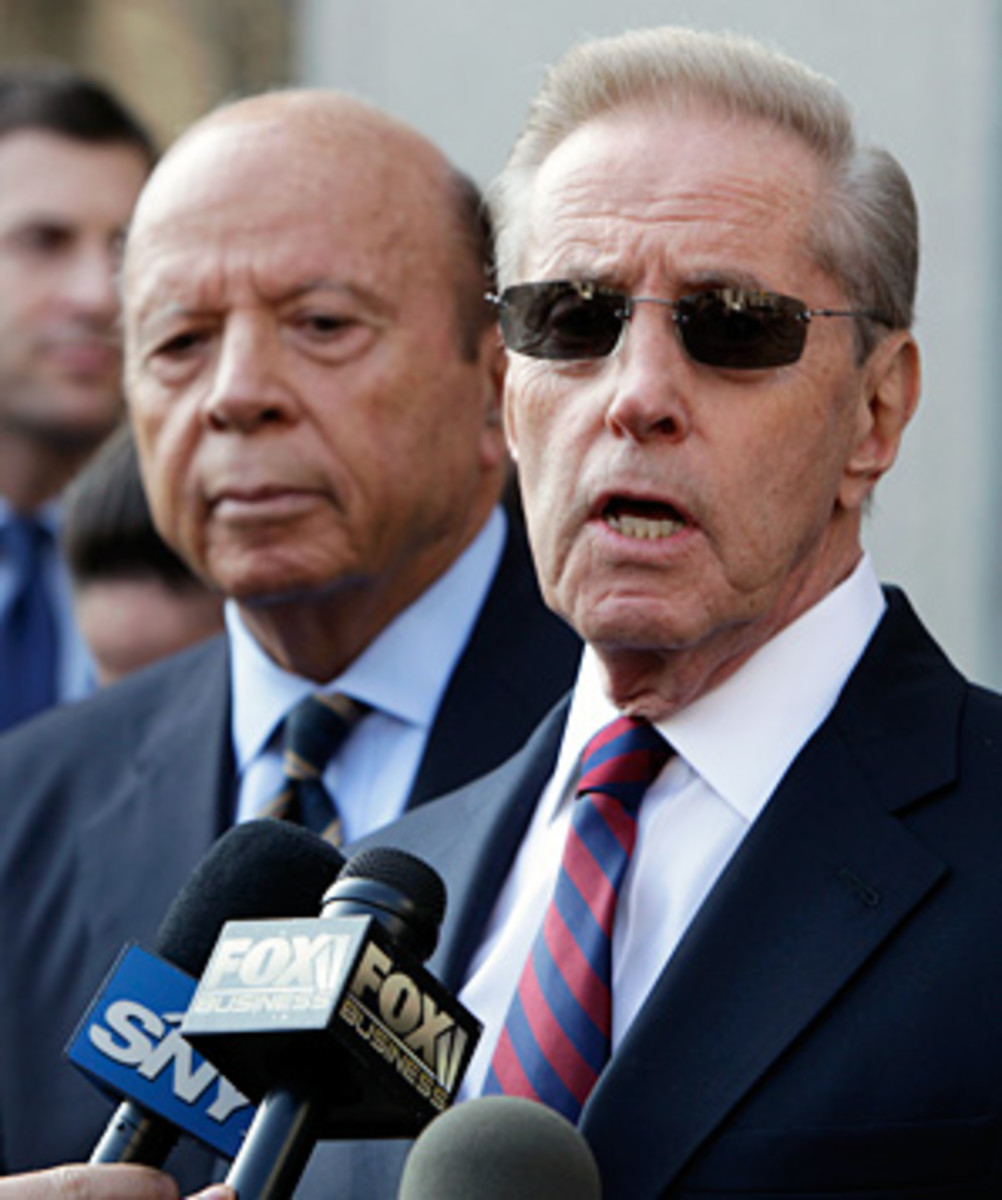Madoff-related settlement offers benefits for New York Mets' owners
Some soul searching and risk aversion likely contributed to the owners of the New York Mets, Fred Wilpon and Saul Katz, agreeing to pay $162 million to victims of convicted felon Bernard Madoff. In exchange, all Madoff-related claims against Wilpon and Katz will be dropped and a trial that had been scheduled for today will never occur. The settlement also provides that Wilpon and Katz will not have to begin payments for three years, that they can draw from the $178 million in claims they have against Madoff's estate and that the two Mets owners will only be personally liable for a fraction of the $162 million (reportedly about $29 million).
The victims are represented by Irving Picard, who had insisted that Wilpon and Katz knew or should have known that their investments with Madoff benefited from his fraudulent pyramid scheme. Last week, U.S. District Judge Jed Rakoff ruled that Wilpon and Katz must pay up to $83.3 million in fictitious "profits" they obtained through Madoff. Rakoff expressed skepticism, however, that Wilpon and Katz were "willfully blind", which means that they knew or should have known of Madoff's fraudulent acts, but in an absence of good faith, choose not to investigate. Put more bluntly, they engaged in "hear no evil, see no evil". A jury would have decided the question of willful blindness and whether Wilpon and Katz would have been forced to pay an additional $303 million, which represented their principal investment.
For Wilpon and Katz, the settlement provides a number of benefits.
First, it categorically limits the amount of money they have to pay to $162 million, which is linked to their own recovery against Madoff's estate and which is an obligation shared with their company, Sterling Equities. Equally important, the settlement provides them with a three-year window to raise the money. While the dollar amount is considerable, it is far less than the "worst case" scenario that could have emerged through jury deliberations. Had they lost the trial, Wilpon, Katz and their associates could have been forced to pay as much as $386 million, which may have required Wilpon and Katz to sell their majority interest in the Mets. Especially given the three-year delay on payment, the settlement likely means they will not have to sell the team. While that may disappoint some Mets fans, Wilpon and Katz would beg to differ.
Second, the settlement prevents jurors from deciding Wilpon and Katz's fate. Juries can be unpredictable, and even if the trial showed that Wilpon and Katz were technically correct in terms of the law, jurors are human and would likely have been quite sympathetic to Madoff's victims. Conversely, jurors may have been skeptical of claims of ignorance by business-savvy and wealthy investors like Wilpon and Katz. Subject legal standards like "willful blindness" and "good faith" are also ripe for juror interpretation, thus escalating the risk of trial for the owners.
Third, the settlement ends the development of the trial record. A trial would have meant witnesses testifying against Wilpon and Katz and revealing facts that could have shamed or humiliated them. In addition, damaging testimony from witnesses would have been widely publicized by the media. Regardless of the trial's outcome, the reputational damage to Wilpon and Katz by the trial itself could have proven substantial and irreparable.
Fourth, the settlement helps Wilpon and Katz rebuild their frayed relationship with other Major League Baseball owners and, more importantly, with commissioner Bud Selig. The controversy embarrassed MLB and its leaders, who understandably do not want to be associated with those who profited at the expense of Madoff's victims. While Wilpon and Katz have known Selig for years, the commissioner -- as Dodgers owner Frank McCourt knows all too well -- is not adverse to kicking out a discredited owner from the club. A jury verdict against Wilpon and Katz could have motivated Selig and owners to seek their removal, which would have likely made them incapable of purchasing another franchise in a major professional sports league.
Fifth, the settlement allows the Mets franchise to refocus its attention on baseball operations and make plans to internalize the $162 million in their allocation of resources. Although the $162 million is not directly tied to the team and although Wilpon and Katz are only on the hook for a portion of the amount, it clearly impacts the amount of money Wilpon and Katz have to spend. The two owners have actively sought investors for minority stakes in the franchise and will continue to do so. Potential minority-stake owners may find the resolution of the Madoff trial makes the team a more attractive investment, since it's now clear that Wilpon and Katz are unlikely to sell their majority stake to some other persons or entity.
The settlement also benefits Picard and Madoff victims. For one, the amount of money is considerable and tens of millions of dollars higher than $83 million cited by Rakoff, although Madoff's victims will never be made whole.
Second, a settlement removes the possibility of Wilpon and Katz seeking review from appellate courts, which could have lasted years and potentially led to Wilpon and Katz prevailing. Given Wilpon and Katz's resources, they would have likely sought every possible appeal.
Third, the settlement enhances Picard's reputation and should cause others who profited from Madoff to worry about his claims against them. While Picard initially sought over $1 billion from Wilpon and Katz, he still walks away from the case with a great deal of money for his clients.






